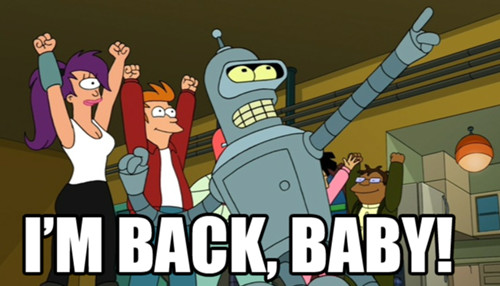Guess What…

Hi! Hello! How have you been? I know… you can’t answer that question. Comments are turned off. But, still, for your own sake, I’d like you to answer it anyway. How have you been?
If you find you aren’t doing too well, then I encourage you to stop what you are doing right now. Put down your mobile device, or move away from your computer, and take 5 minutes for whatever you want. Rest your eyes, stretch your body, reach out to a friend, sit in silence – listen to your body. Everything else will still be here when you are done. (Breath)
Now, if you wish to continue, then let me answer that question – I’m really f****** good. I don’t know if I ever mentioned this to you before, but the Pandemic, and all the years that followed, broke me. They broke me in more ways than I thought possible. And, honestly, before my sabbatical, I was starting to wonder if I’d ever recover, despite all my best effort. But, sabbatical, it was like magic. This time away – studying, resting, connecting with colleagues – was more restorative than I dreamed it would be. Perhaps, one day, I will tell you the full story of how the pandemic broke me, of all that I did to repair myself, and how Sabbatical was the missing key to my continued recovery. But, I’m not quite ready to tell that story yet. So, instead, I’m going to share some key quotes and questions I gathered during my sabbatical.
To begin, I want to share a few quotes and questions from the book The Good Enough Job by Simone Stolzoff. This is the first book I read while on sabbatical. If you are struggling with work-life balance, burnout, or the ravages of classism, then I’d highly recommend this book to you…
Quotes
- For White-Collar professionals, jobs have become akin to a religious identity; in addition to a paycheck, they provide meaning, community, and a sense of purpose. p. xii
- Most religious traditions actively separate divinity from productivity – as either a separation of time, as in the Jewish tradition of Shabbat; a separation of space, as in a monastery isolated rom the rest of society; or a separation of behavior, as in the Islamic call to prayer, which halts all other activities five times a day. p. 36
- Promoting the message that a profession is inherently righteous allows people in positions of power to characterize injustices as isolated incidents rather than systemic failures – if they’re even discussed at all. p. 51
- But it isn’t just our country or employer that imposes this value system on us. Using productivity to measure worth is a standard we also impose on ourselves. And in the process, many Americans have internalized the values of our dominant economic system: Capitalism. p. 71
- Koretz recommends building infrastructure around sacred time as one might build infrastructure around sacred space like a temple, mosque, or church. p. 76
- Play is a natural antidote to workism. p. 77
- According to a report from the Economic Policy Institute, the lowest-earning quintile of Americans worked nearly 25% more hours in 2016 than they did in 1979… Overwork is not simply a matter of the number of hours worked, but also the intensity and unpredictability of those hours. p. 116
- Workplace communication apps keep knowledge workers perpetually half connected, in a state reminiscent of sharks sleeping with one eye open. p. 142
- Developing a healthier relationship to work starts with defining what you want that relationship to be. If not, your employer will happily define the relationship for you. p. 155
- Furthermore, overwork is a systemic issue – one that is the result of economic, political, and cultural factors – and thus there are limits to individual interventions. All too often, the ones that carve out and protect space for our nonwork selves falls on workers. Common anti-burnout advice like “set a boundary,” or “practice self-care” crumbles without institutional support behind it. p. 182
- To decouple our human needs from our employment status is to declare that each of us has worth whether or not we have a full-time job. p. 189
- A 2021 survey from the Society for Human Resource Management found that 41% of Americans feel burned out. p. 190
- I found that those with the healthiest relationship to their work had one thing in common: They all had a strong sense of who they were when they weren’t working. p. 196
Questions
- How do Unitarian Universalists promote a separation between divinity and productivity? How do Unitarian Universalists sanctify a connection between divinity and productivity?
- As a society, we regularly recognize people’s labor / contributions / output / productivity. But, when do we recognize people’s “ever-green” characteristics (i.e. When do we recognize people because they are good listeners, or gregarious, or [fill in positive adjective here])?
- What does a liberatory Unitarian Universalism look like when our current culture is steeped in workism? What feels liberatory to you?
- How would you like to define your relationship to work?
- Who are you outside of your work?
That’s all I got for you now. Check back in a few weeks where I will share quotes and questions from Tricia Hersey’s groundbreaking work Rest is Resistance.
